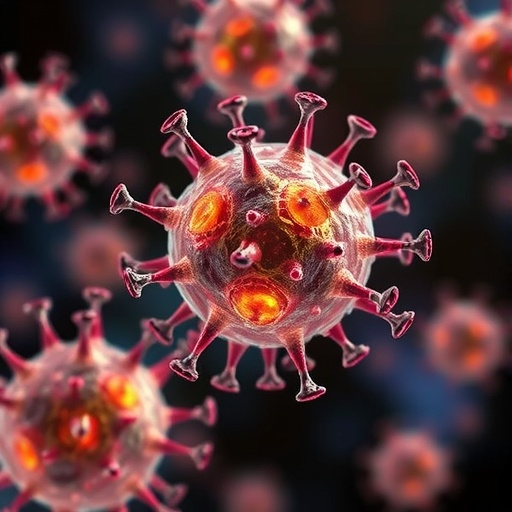In a significant leap forward for cancer immunotherapy, researchers at MIT and Harvard Medical School have unveiled an innovative method to genetically engineer chimeric antigen receptor natural killer (CAR-NK) cells that exhibit enhanced anti-tumor efficacy while evading immune rejection. This breakthrough addresses a persistent challenge in cellular immunotherapy: the host immune system’s propensity to recognize and destroy administered donor cells, undermining their therapeutic potential. The research, recently published in Nature Communications, details a sophisticated engineering approach that enables CAR-NK cells to circumvent host immune defenses, thereby paving the way for more effective, readily available cancer treatments.
Natural Killer (NK) cells serve as crucial sentinels within the innate immune system, tasked with identifying and eliminating malignantly transformed or virus-infected cells. Unlike T cells, NK cells recognize their targets via a constellation of activating and inhibitory receptors, enabling them to discriminate between healthy and aberrant cells. Their cytotoxic function, notably through a process termed degranulation, involves the release of perforin and granzymes—proteins that induce apoptosis in target cells. Leveraging these intrinsic properties, scientists have harnessed NK cells as vehicles for chimeric antigen receptor (CAR) engineering, programming them to selectively target cancer-specific antigens.
Traditional CAR-NK or CAR-T cell therapies rely on autologous cell extraction, where immune cells are harvested from the patient, engineered ex vivo, and expanded over several weeks before reinfusion. This process, while personalized, is hampered by logistical delays and compromised cell viability, particularly in patients with weakened immune systems. An appealing alternative strategy involves utilizing CAR-NK cells derived from healthy donors, which can be pre-manufactured and stored for immediate use—a concept embodying the “off-the-shelf” therapeutic paradigm. Nonetheless, a formidable barrier has been the recipient’s immune system recognizing these allogeneic NK cells as foreign, initiating an immune attack that diminishes their therapeutic window.
The team’s approach to overcoming this impediment centers on the selective knockdown of human leukocyte antigen (HLA) class I molecules on the surface of donor CAR-NK cells. Typically, HLA class I proteins act as “self” markers to prevent immune destruction, but when donor cells express disparate HLA molecules, they become targets for host T cell-mediated rejection. By employing short interfering RNA (siRNA) technology to silence the expression of genes coding for HLA class I, the researchers effectively masked the CAR-NK cells from host immune surveillance. This ingenious tactic prevented activation of host T cells against the therapeutic cells.
In parallel, the researchers enhanced the innate anti-cancer functionality of the CAR-NK cells by incorporating genes encoding immune-modulatory proteins such as programmed death-ligand 1 (PD-L1) and single-chain HLA-E (SCE). PD-L1 expression can attenuate host immune responses by engaging inhibitory receptors on T cells, thereby fostering an immunosuppressive microenvironment beneficial for NK cell persistence. Meanwhile, SCE, a non-classical HLA molecule, further augments immune evasion by engaging natural killer cell inhibitory receptors and promoting survival. Notably, all genes—including those encoding for CAR, siRNA targeting HLA class I, PD-L1, and SCE—were delivered simultaneously via a single genetic construct. This multiplex engineering streamlined the production of immune-evasive CAR-NK cells.
To validate the efficacy of these engineered cells, the team conducted experiments in humanized mouse models implanted with human lymphoma cells expressing the CD19 antigen, a common target in B cell malignancies. Treatment with the novel CAR-NK cells resulted in sustained cell persistence over at least three weeks, coupled with robust tumor clearance. In contrast, control groups receiving unmodified or single-modification CAR-NK cells exhibited rapid elimination of donor NK cells by host immunity and unrestrained tumor progression. These results underscore the crucial role of immune evasion in prolonging CAR-NK cell activity and therapeutic impact.
An additional promising finding was the markedly reduced incidence of cytokine release syndrome (CRS) in mice treated with the engineered CAR-NK cells. CRS, characterized by excessive systemic inflammation due to overactivation of immune effector cells, is a significant adverse event that has hindered the broader application of CAR-T cell therapies. The improved safety profile implicated in CAR-NK treatments could revolutionize immunotherapy, making it accessible to a wider patient population with reduced risks.
This breakthrough holds substantial implications for the future of cancer therapy. The ability to produce “off-the-shelf,” immune-evasive CAR-NK cells circumvents the time-intensive preparation associated with autologous therapies, enabling rapid intervention soon after diagnosis. Moreover, the strategy can potentially be adapted for CAR-NK cells targeting various tumor antigens beyond CD19, broadening the scope of treatable cancers. Given the modularity of the genetic construct, incorporating additional immune-regulatory or efficacy-enhancing genes remains feasible.
Beyond oncology, the researchers are exploring applications of their technology for autoimmune diseases such as lupus, where dysregulated immune responses attack healthy tissues. Engineering CAR-NK cells capable of modulating pathological immune activity represents a novel avenue toward treating such conditions with precision and minimized systemic immunosuppression. Collaborative efforts are underway with industry partners and clinical institutions, including the Dana-Farber Cancer Institute, to translate these findings into human trials.
Senior author Jianzhu Chen emphasized the transformative potential of this development: “Our one-step engineering platform enables us to produce CAR-NK cells that are not only potent killers of cancer cells but are also invisible to host immune components that would typically reject them. This combination of efficacy and safety sets a new standard for adoptive cell therapies.” His co-author Rizwan Romee concurred, highlighting the practical advantages for clinical implementation and patient outcomes.
In conclusion, this landmark study delineates a comprehensive genetic engineering strategy that equips CAR-NK cells with dual capabilities: evading allogeneic rejection and potentiated tumor cell killing. By overcoming fundamental immunological barriers, these next-generation CAR-NK cells hold immense promise as a versatile and safer immunotherapy platform. Ongoing preclinical investigations and impending clinical trials will determine their efficacy in humans and expand the therapeutic horizons for cancers and immune disorders that have thus far eluded durable treatment.
Subject of Research: Animals
Article Title: Selective HLA knockdown and PD-L1 expression prevent allogeneic CAR-NK cells rejection and enhance safety and anti-tumor responses in xenograft mice
News Publication Date: 8-Oct-2025
Image Credits: NIAID
Keywords: Cancer, Immunotherapy, Immunology, Cell biology, Cells




